Mike R. Curran
have a good time
Kristina Johnson
09/2021
KJ︎︎︎ is an artist, curator, and the director of Waiting Room. In have a good time, she invites you out for an evening of summer indulgence and backyard bliss, topped with your choice of condiments. Featuring new drawings, sculptures, and other goodies from the whimsical and deeply thoughtful artist.
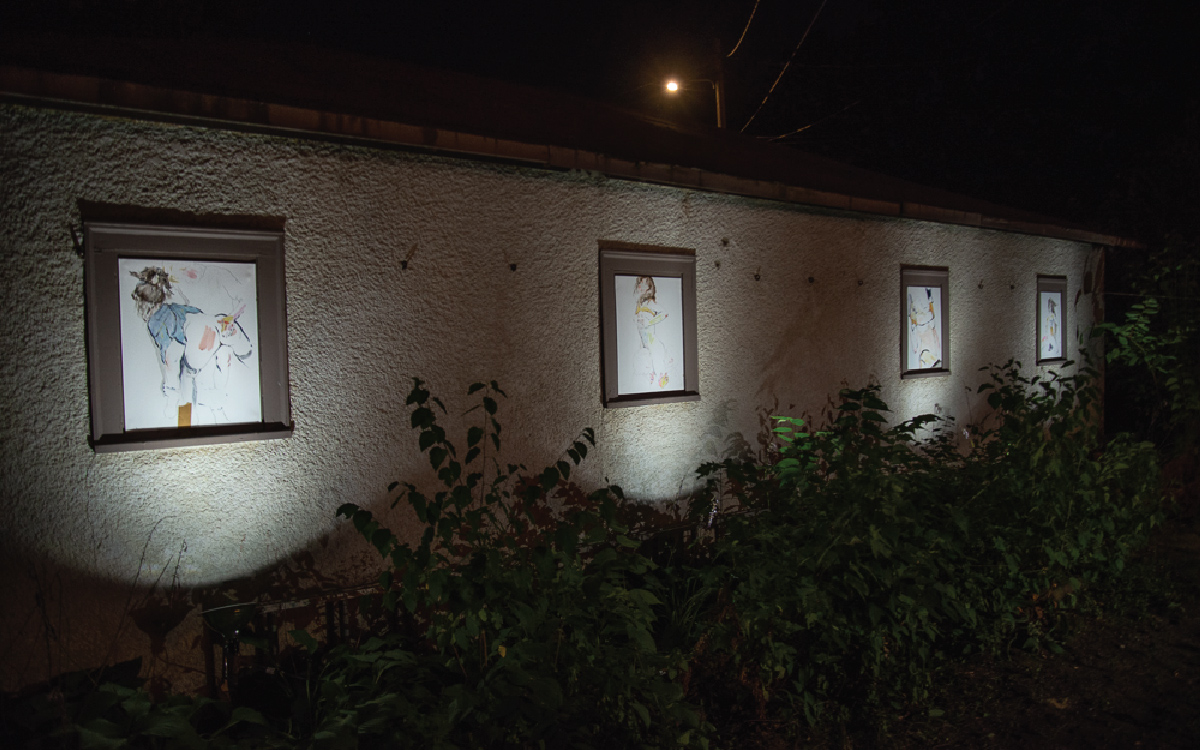
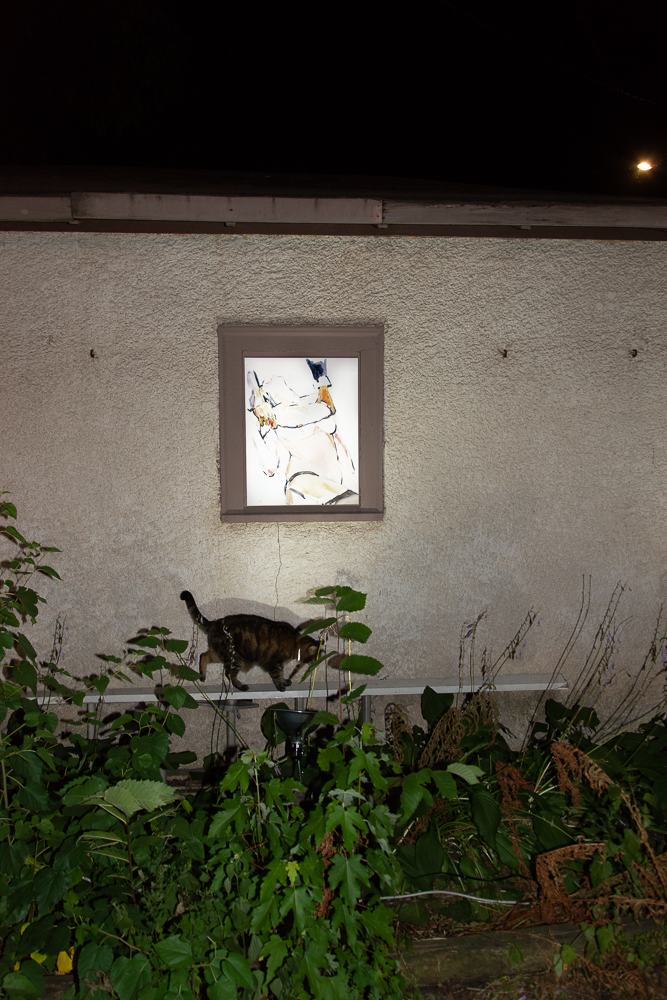
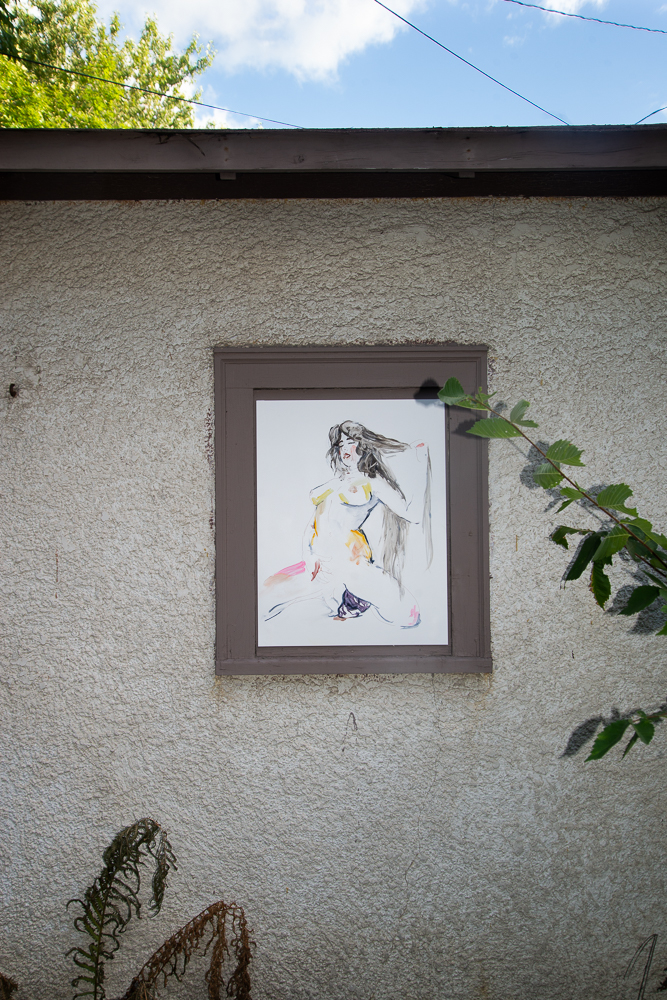
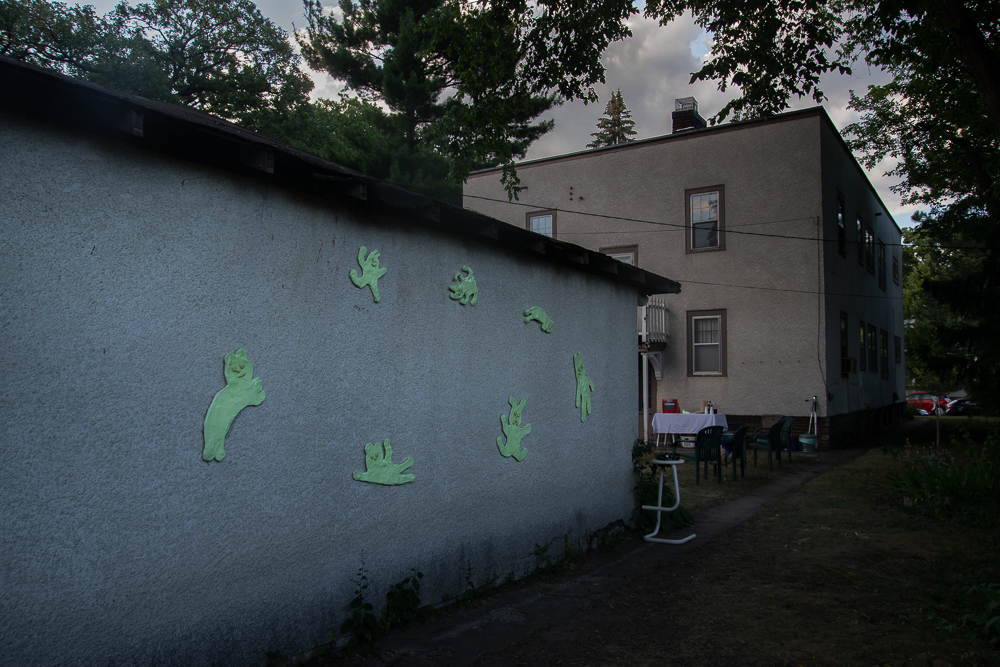
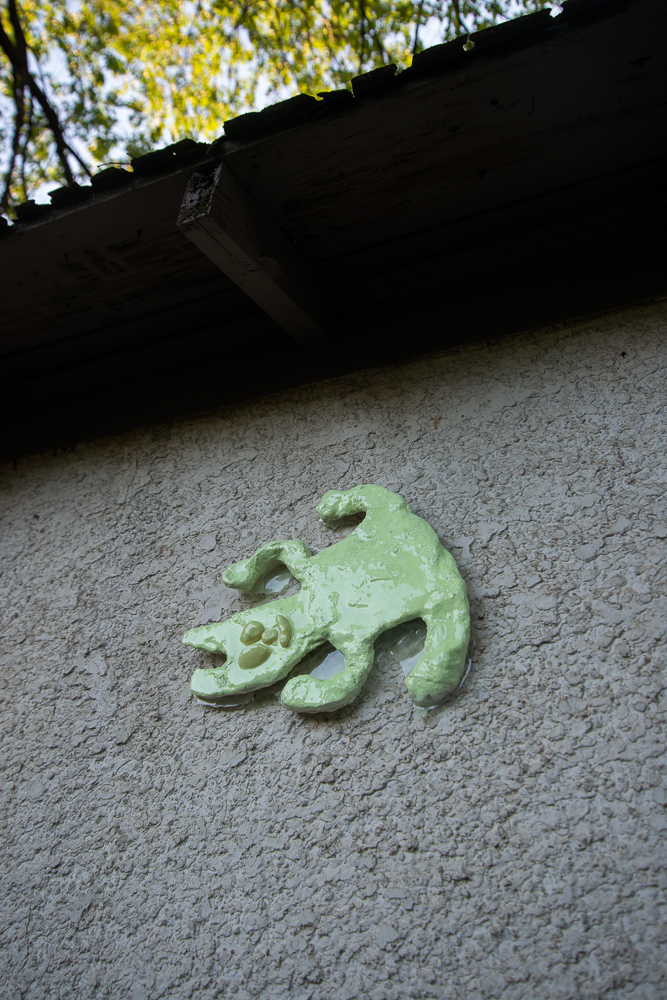
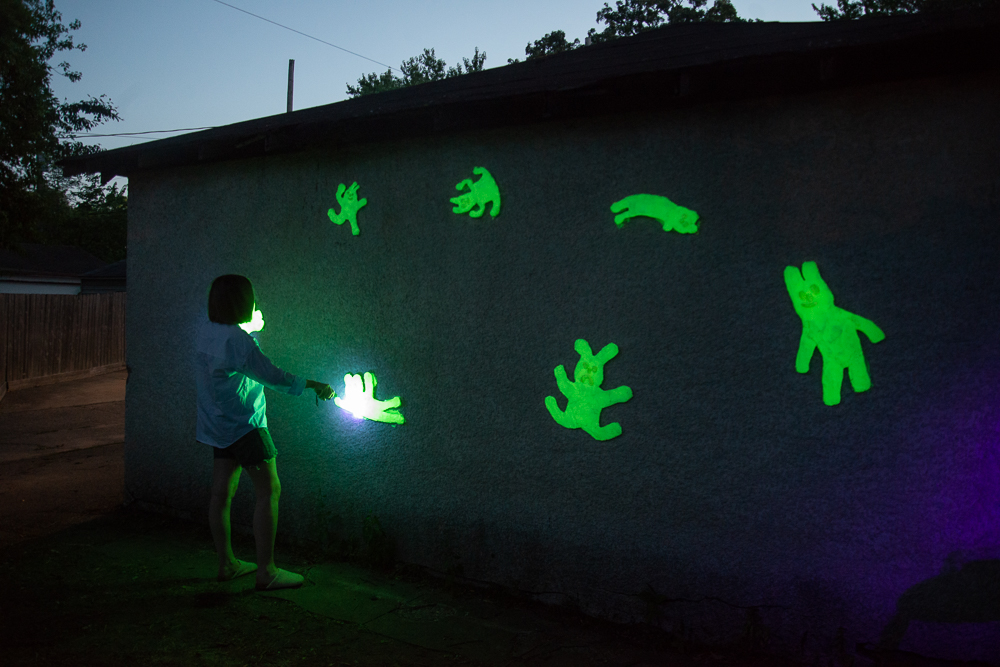
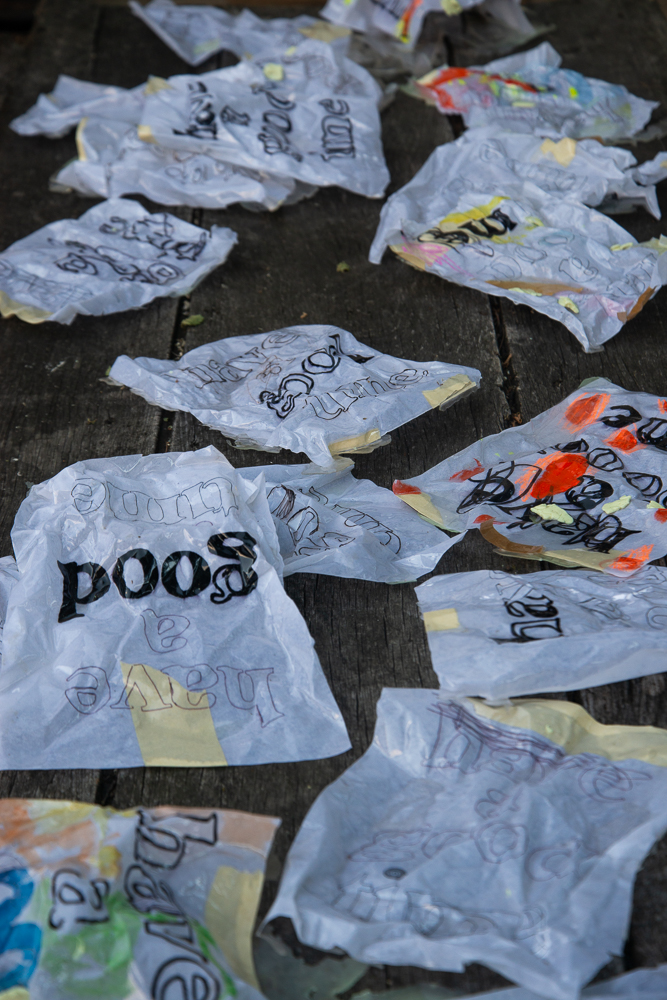
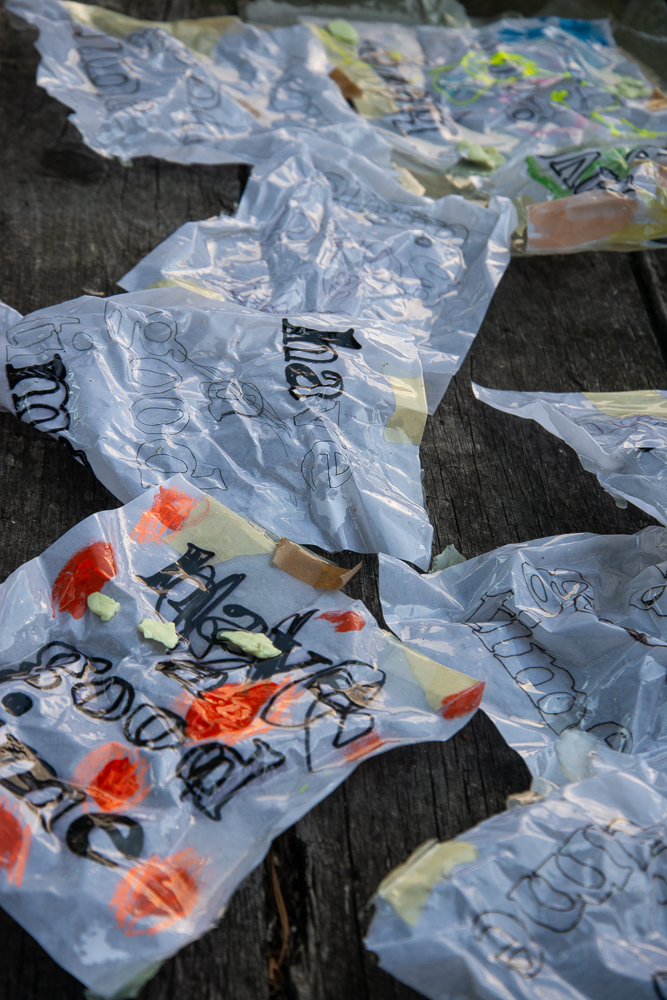
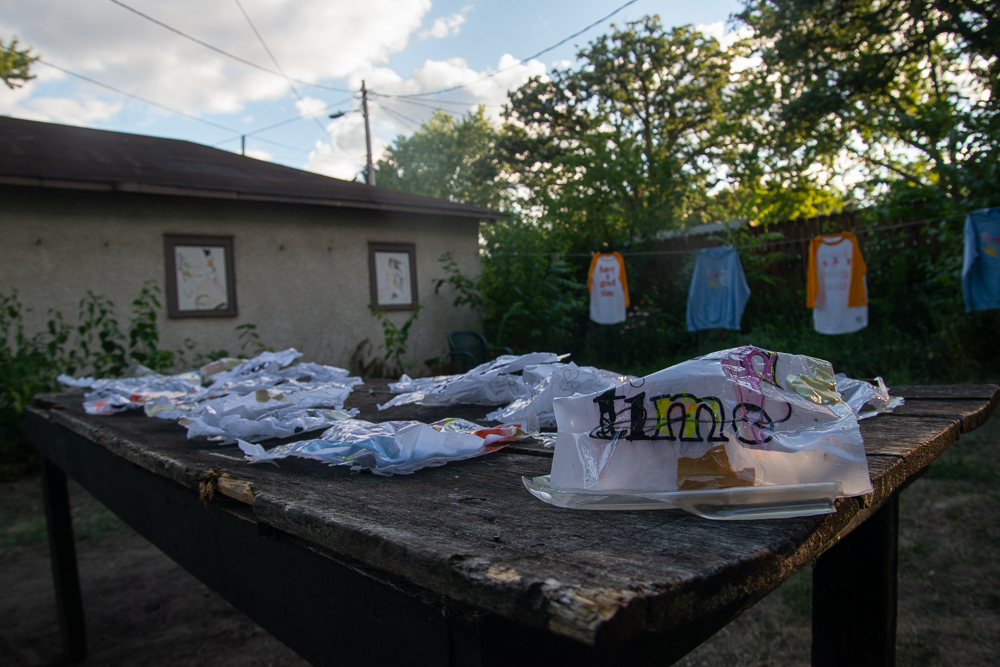
Installation images by KJ.
Curatorial Essay
“have a good time” is a summer slogan. It belongs to the waterslide attendant in a blue polo and white flip flops who mumbles it before nudging your tube through the opening of a dark tunnel. It belongs to my mother, who would wish it when dropping me off at baseball camp, before I could run off and huddle with the other boys already spitting into their mitts to loosen the leather. It’s a courtesy from the slide attendant and a hope from my mother; but KJ’s “have a good time” unfurls like a long-awaited invitation.
Since the first round of lockdowns were announced in Minnesota last March, our time together has been confined to short bursts and rendered by unstable connections. Nevertheless, we were made to press on with the quantifiable parts of our lives—schoolchildren kept an impossible pace, never-ending office meetings simply shifted online—while everything else flattened out. Among the uncountable things we lost was time spent lingering in each other's company—that sweet, meandering time when dessert gets ordered and the conversation veers towards some unexpected place where you’re happy to end up but not entirely sure how you arrived. With have a good time, KJ has created this kind of indulgent space, calling us back to each other over a serving of strawberry shortcake.
However, as the light drains from the day and you splash a second, then a third condiment onto your hot dog, your sense of welcome might wear. Plaster bummer boys—recurring characters in KJ’s drawings and paintings—are scattered across the backyard, finding higher ground in the trees and taking cover in the grasses. Their beady eyes take notice as we linger, and we become bears interrupting their picnic. Under a certain light, the boys in the trees look down upon us as if they’re enjoying a joke at our expense; we wonder if those in the grasses are also here for a good time, or to judge us for our extravagance while the virus continues to rage across further away continents.
In a desperate attempt to find clear meaning behind their doughy eyes, we might mistakenly compare the bummer boys to garden gnomes. But these are ambiguous beings, not lawn ornaments that can be dressed up and shown off to neighbors (a quick online search summons a gnome in a Harley Davidson jacket, another bent on his knee looking down the sights of a rifle). KJ’s bummer boys are more like strangers shifting around the edge of the party who speak only to one another. A discomfort arises in the tension between our two groups, one glowing and fixed in place, the other glistening with sweat and swinging flashlights.
This discomfort should be familiar: For the past year and a half we have skirted around each other, fearing an unseeable thing. Even before the pandemic, our collective trust has been steadily deteriorating. I’m reminded of a study conducted a few years ago which found that less than a third of Americans agreed that “most people can be trusted.” I cannot imagine that percentage improving since, now that a cough invokes an entire ideology, and the revving of a truck’s engine recalls the storming of the capitol, barricades colliding with glass.
Of course, distrust is not a uniquely American phenomenon, but, like microwavable popcorn and the segway, it has been perfected here. Something else perfected here is the technique behind eating 76 hot dogs in ten minutes—a record set by competitive eater Joey “Jaws” Chestnut. He soaks his buns in water—others use Crystal Light or lemonade—so they smoothly slide down his esophagus; then, while chewing, he contorts his body and bounces up and down, letting gravity accelerate his digestion. Though not featured in have a good time, KJ has made a number of paintings devoted to Joey, suspending the champion mid-bite, confetti forever streaming in the background.
What strikes me most about these earlier paintings is how she softens the spectacle, instead directing our attention to carefully observed hand gestures: In one, Chestnut’s left hand covers his gaping mouth, the other grips two franks; more disembodied hands throng behind him, with delicate fingers flipping scorecards or holding microphones. With sparingly-applied watercolor strokes, the four paintings installed within the garage window wells in have a good time also emphasize hands, offering moments of touch and physicality without becoming crass. Their scenes situated somewhere between pleasure and punishment, these paintings exemplify the many layers of KJ’s approach to art-making—a balance of levity and heaviness, whimsical at the surface and meditative just below.
To return to the art world we had before the pandemic, impersonal and hyper-intellectualized as it mostly was, would be a terrific blunder. As a curator and director of the art gallery Waiting Room who devotes much of her energy towards supporting local artists, KJ no doubt shares this worry over a supposed return to normalcy. Not taking itself too seriously while still giving you a whole mouthful to chew on, have a good time sets the table for more welcoming and gratifying encounters to come. More immediately, with the bummer boys as foils, the installation might help us relearn how to relate to the proximity of other bodies.
Or maybe it’s not about any of this at all, and I’ve commandeered your attention away from the fun. Either way, just please enjoy yourself, OK?
Since the first round of lockdowns were announced in Minnesota last March, our time together has been confined to short bursts and rendered by unstable connections. Nevertheless, we were made to press on with the quantifiable parts of our lives—schoolchildren kept an impossible pace, never-ending office meetings simply shifted online—while everything else flattened out. Among the uncountable things we lost was time spent lingering in each other's company—that sweet, meandering time when dessert gets ordered and the conversation veers towards some unexpected place where you’re happy to end up but not entirely sure how you arrived. With have a good time, KJ has created this kind of indulgent space, calling us back to each other over a serving of strawberry shortcake.
However, as the light drains from the day and you splash a second, then a third condiment onto your hot dog, your sense of welcome might wear. Plaster bummer boys—recurring characters in KJ’s drawings and paintings—are scattered across the backyard, finding higher ground in the trees and taking cover in the grasses. Their beady eyes take notice as we linger, and we become bears interrupting their picnic. Under a certain light, the boys in the trees look down upon us as if they’re enjoying a joke at our expense; we wonder if those in the grasses are also here for a good time, or to judge us for our extravagance while the virus continues to rage across further away continents.
In a desperate attempt to find clear meaning behind their doughy eyes, we might mistakenly compare the bummer boys to garden gnomes. But these are ambiguous beings, not lawn ornaments that can be dressed up and shown off to neighbors (a quick online search summons a gnome in a Harley Davidson jacket, another bent on his knee looking down the sights of a rifle). KJ’s bummer boys are more like strangers shifting around the edge of the party who speak only to one another. A discomfort arises in the tension between our two groups, one glowing and fixed in place, the other glistening with sweat and swinging flashlights.
This discomfort should be familiar: For the past year and a half we have skirted around each other, fearing an unseeable thing. Even before the pandemic, our collective trust has been steadily deteriorating. I’m reminded of a study conducted a few years ago which found that less than a third of Americans agreed that “most people can be trusted.” I cannot imagine that percentage improving since, now that a cough invokes an entire ideology, and the revving of a truck’s engine recalls the storming of the capitol, barricades colliding with glass.
Of course, distrust is not a uniquely American phenomenon, but, like microwavable popcorn and the segway, it has been perfected here. Something else perfected here is the technique behind eating 76 hot dogs in ten minutes—a record set by competitive eater Joey “Jaws” Chestnut. He soaks his buns in water—others use Crystal Light or lemonade—so they smoothly slide down his esophagus; then, while chewing, he contorts his body and bounces up and down, letting gravity accelerate his digestion. Though not featured in have a good time, KJ has made a number of paintings devoted to Joey, suspending the champion mid-bite, confetti forever streaming in the background.
What strikes me most about these earlier paintings is how she softens the spectacle, instead directing our attention to carefully observed hand gestures: In one, Chestnut’s left hand covers his gaping mouth, the other grips two franks; more disembodied hands throng behind him, with delicate fingers flipping scorecards or holding microphones. With sparingly-applied watercolor strokes, the four paintings installed within the garage window wells in have a good time also emphasize hands, offering moments of touch and physicality without becoming crass. Their scenes situated somewhere between pleasure and punishment, these paintings exemplify the many layers of KJ’s approach to art-making—a balance of levity and heaviness, whimsical at the surface and meditative just below.
To return to the art world we had before the pandemic, impersonal and hyper-intellectualized as it mostly was, would be a terrific blunder. As a curator and director of the art gallery Waiting Room who devotes much of her energy towards supporting local artists, KJ no doubt shares this worry over a supposed return to normalcy. Not taking itself too seriously while still giving you a whole mouthful to chew on, have a good time sets the table for more welcoming and gratifying encounters to come. More immediately, with the bummer boys as foils, the installation might help us relearn how to relate to the proximity of other bodies.
Or maybe it’s not about any of this at all, and I’ve commandeered your attention away from the fun. Either way, just please enjoy yourself, OK?